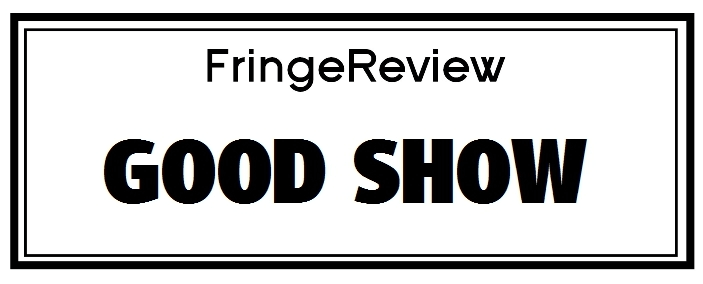Edinburgh Fringe 2022
No Place Like Home
Alex Roberts & Company

Genre: LGBT Theatre, Solo Show, Theatre
Venue: Pleasance Dome - 10Dome
Festival: Edinburgh Fringe
Low Down
A mix of video art, dance, drama and epic poem that follows two main characters, one innocent, one scene-hardened, who hook up in a gay club, with tragic and stereotype-reinforcing consequences, that claims to explore violence in the LGBT+ community.
Review
No Place Like Home calls itself “a tragic odyssey into gay club culture and the places we can call home.” It is certainly impressive in its fusion of dance, video art and music with spoken word sections split equally between epic poem and solo drama, where the performer, Alex Roberts, adeptly plays various characters.
The timing and precision of Roberts’ interaction with the video projections (including neon video art) and sound elements (music, voices, interacting as dialogue) shows virtuosity and performance skill, helping maintain the momentum, pace and energy of the show throughout. It looks and sounds slick and impressive.
But such elements cannot replace or compensate for story, and for the first fifty minutes of this hour-long drama, we are served a glossily packaged but slow-moving story of a relatively innocent gay teenager, Connor, who acts on a crush for the only out lad at his school, and visits a gay club for the first time. At the club, his hopes of hooking up with his school mate are dashed but he stays to experience his first long night of dancing, flirting and cruising in such a place. Occasionally he is overwhelmed and takes refuge in the toilets, where he meets Rob, sometimes the barman at the club, a 30-something stunner who has weathered the gay club scene for many years. A playful and witty game of psychological cat and mouse gradually brings them together and by fifty minutes in, we’ve had a gentle paced story journey that hasn’t told us much new about gay club life or culture or what it takes to be brave enough to step into this world for the first time. I would have welcomed the use of the clever, impressive staging elements and forms to tell a story that starts by getting under the skin of the doubts, fears and dilemmas that young gay people face as they learn how to navigate the raunchy and confronting gay club scene, and quickly moves on to the promised exploration of abuse/violence in the gay community.
When Roberts is portraying multiple characters, we get colour, variety and different registers. But when delivering the poetry, Roberts uses the same tone, pace and pitch throughout. The first ten minutes of the play is in these rhyming couplets, and it very quickly loses emotional impact because the delivery does not change, so becomes quite robotic. To sustain epic poem-based drama, variety of delivery is essential, and with the music beats behind it, a semi-rap delivery kept the same rather clinical feel to the poetry elements that reduced its emotional impact.
But the biggest change I would like to see, if this piece evolves, is to deliver on what the advance publicity promises, “when a kiss leads to a brutal attack – who’s the victim and who’s the perpetrator?” The drama is supported by GALOP, an admirable organisation that is the UK’s LGBT+ anti-abuse charity, working with and for LGBT+ victims and survivors of interpersonal abuse and violence. To explore this complex issue, we need it to surface before the fiftieth minute of a sixty minute drama. The promised brutal attack springs from nowhere, and delivers yet another climax to a drama with gay central characters, where we are portrayed as damaged, mentally deranged, dangerous monsters who have such inner turmoil they are unable to deal with everyday interactions such as flirting and cruising. The other stereotype that drama and literature has visited on gay characters for centuries is to punish those that wish or try to live an open, free, self-expressed life, and Connor is punished to the max for his first foray into gay club culture, a sensationalist twist that will do little to encourage young gays to dip their toes into the waters of gay life.
Of course violence exists in all communities, and the gay community is no exception. Thankfully, such unprovoked, extreme violence as portrayed here is rare in the UK, but everyday physical abuse/violence, gradually building from low level to more extreme, is common in all communities. This feels like a missed opportunity to spend most of the hour exploring the causes, realities and some solutions or coping mechanisms when violence does surface in gay culture or relationships. This would have required a story where the violence starts surfacing early and was the engine driving the plot, rather than a last minute extreme explosion of unexplored/unmotivated violence. Here it felt like form was driving the piece. We are left seeing our two gay characters as either dangerously dysfunctional or hopelessly naïve, without any way forward. Such portrayals do little to dismantle stereotypes, counter a history of pejorative portrayals of gay men or help unpick the complex realities of physical violence and abuse in the gay world, where we would need to see both sides as human, not, as has so often been the case, and is the case here, portraying gay men as monsters or helpless victims. In this case, Connor, a victim of savage brutality, is even the one apologising as he fades away.
I am very glad I saw this piece. It reminded me of the need to assess what the aim of a drama is, especially one claiming to address a societal issue, and put that at the heart of the design, to ensure one doesn’t possibly achieve the opposite. As the title suggests, the drama portrays those entering the gay community, seeking romance or companionship, as finding no place like home, nor any support, protection or hope, and will be lucky to escape with their lives. Welcome!


















































